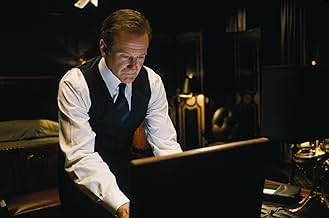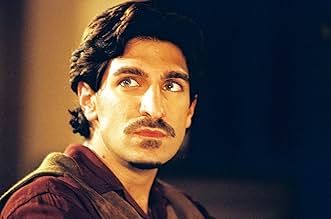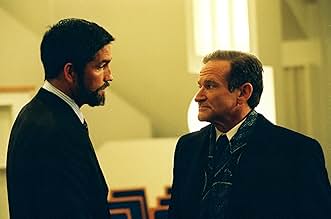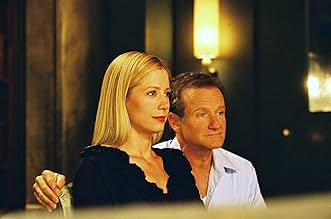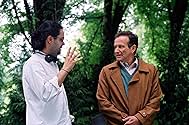CALIFICACIÓN DE IMDb
6.1/10
35 k
TU CALIFICACIÓN
En un mundo donde hay chips que registran la vida de una persona, vive Alan, el mejor editor de películas de que existe. Sin embargo, sufrió un trauma que le llevará a identificar en una pel... Leer todoEn un mundo donde hay chips que registran la vida de una persona, vive Alan, el mejor editor de películas de que existe. Sin embargo, sufrió un trauma que le llevará a identificar en una película a una persona que debería estar muerta.En un mundo donde hay chips que registran la vida de una persona, vive Alan, el mejor editor de películas de que existe. Sin embargo, sufrió un trauma que le llevará a identificar en una película a una persona que debería estar muerta.
- Dirección
- Guionista
- Elenco
- Premios
- 1 premio ganado y 4 nominaciones en total
Tarek Bishara
- Hasan
- (as Thom Bishops)
- Dirección
- Guionista
- Todo el elenco y el equipo
- Producción, taquilla y más en IMDbPro
Opiniones destacadas
Set in a world with memory implants, Robin Williams plays a cutter, someone with the power of final edit over people's recorded histories. His latest assignment is one that puts him in danger.
While this is an interesting science fiction universe in and of itself, it also has an interesting message on surveillance and Neo-Luddism. While the idea of having your life on film for future generations may sound pleasant (or horrible), it puts everyone in the path of a camera -- anyone who looks at you may be recording your every move.
This is an idea that is thoughtful and well-presented. Maybe they could have explored the theme more, and it might even be worth returning to this universe in a future film...
While this is an interesting science fiction universe in and of itself, it also has an interesting message on surveillance and Neo-Luddism. While the idea of having your life on film for future generations may sound pleasant (or horrible), it puts everyone in the path of a camera -- anyone who looks at you may be recording your every move.
This is an idea that is thoughtful and well-presented. Maybe they could have explored the theme more, and it might even be worth returning to this universe in a future film...
I have always been a Robin Williams fan. From watching him goof around in Mrs. Doubtfire when i was a kid to seeing him actually creep me out in One Hour Photo, probably his best movie to date. So i am willing to see anything he has to offer. I got a chance to see The Final Cut for free, so i took it. The plot seemed real interesting and it was a first. Later into the movie though, the plot was getting cut more than people's memories. Williams romance with Mira Sorvino (which was gag-worthy to begin with) doesn't have any closure, and the "cutting" procedure and the whole "chip in the brain" thing didn't seem too thought out. Robin Williams is good as always and he tries his best to keep you interested, and the opening of the movie was promising. I even think with a little work that director Omar Naim can make some really quality flicks. This one, however, seems like it was cut together from a better movie. Which is a shame because it was a really cool idea. 5/10
I don't completely understand the negative reviews of this film because I thought films (except for documentaries) legitimately use the "willfull suspension of disbelief" to accomplish their goals of entertainment. Granted, not everything in this film makes perfect logical sense and could have been written just a little better (or maybe suffers the fate of all literature to film shortcomings) but I absorbed the film as a morality/ethics dilemma rather than a logical tale of facts and relationships. I do concede the ending left me a little wanting for resolution.
Good questions were touched upon in a less than preachy head slap because of the low key acting presentations. And Williams has always held my attention in any of his work to date. This one is worth watching if you're not a detail critic, though it's not as badly crafted as some would make it seem.
Good questions were touched upon in a less than preachy head slap because of the low key acting presentations. And Williams has always held my attention in any of his work to date. This one is worth watching if you're not a detail critic, though it's not as badly crafted as some would make it seem.
Well, I just saw The Final Cut over the weekend and I am finding myself very disappointed in the movie. From the previews I had imagined something a little different with a lot more action that what took place. There were certain scenes that I felt were good and like them, but all in all I would rather have waited to just rent the movie than to have gone to see it in the theaters. It was a pretty slow moving movie when I was expecting more suspense and action. Robin Williams did a great job in the part, just to clarify. Once again, it was just my view of the movie as a whole that I did not like. The overall plot was good and the storyline had a great theme but as I watched, I just became more and more disappointed. Then at the end, it just kind of ended. To me, I was left with the feeling that there should have been more than just a sudden ending like it had.
In six words: great idea-not so great execution. In a slightly vague future, Robin Williams plays a video editor named Alan, his job is assembling 1-2 hour video portraits of deceased clients whose parent's were well off enough to have had them fitted (while still in the womb) with a "Zoe" implant. Named after the corporation that initially developed this device, the implant records (24-7) everything that happens to a person during their lifetime. It is important to the story that viewers understand that these are not memories but actual recordings. This distinction is critical to the plot as well as to one of the interesting questions posed by the film; to what extent have our actual memories been distorted by time.
The editors (called cutters) must distill down this lifetime of footage into a brief highlights video, discretely deleting scenes that would be offensive to the family of the decreased. This is not that different than the writers of obituary notices (see "Closer"). The video is shown at a special memorial service called a "rememory". To add some unnecessary complexity to the story there is a violent protest group who object to the whole concept. The basis of their objection is never adequately explained but seems to be centered on the fact that the footage is by necessity all from the person's own "point-of-view", with the protesters chanting "remember for yourself".
Of course a Cutter sees everything (mostly in fast motion) making him or her privy to a person's every secret and sin. In the film they briefly raise the most interesting question posed by this whole idea, if you knew that someone (be it man or God) would replay your entire life, to what extent would it change your behavior? In the film most (but not all) people with the implant are aware that they have it.
Knowing all this stuff makes Alan a lonely man. His philosophy: "The dead mean nothing to me, I took this job out of respect for the living", has caused him to avoid close interpersonal relationships, which might compromise the many confidences he is keeping. Within the closed community of cutters he is known as a "Sin Eater" because of his willingness to sanitize the lives of the scum of the earth, accepting clients that the other cutters reject. Williams looks even sadder and more depressed than in did in "What Dreams May Come". It is a extremely restrained performance, not especially challenging but perfectly suited to the mood of this film.
Alan gets in trouble when he takes on a project for a rich widow (Stephanie Romanov). Her husband knew a lot of corporate secrets and had been playing around with their young daughter. This "messing around with something much bigger" has a Raymond Chandler feel to it, and this fits nicely with what might be called a futuristic film noir production design.
Overall the many interesting ethical and philosophical questions raised by "The Final Cut" are more interesting than the film itself. In fact, there is so little real suspense and character identification that the viewing process is mostly an exercise in pulling yourself back from your contemplation of earlier scenes so that you can follow what is happening on the screen.
The film goes wrong by introducing a parallel story about Alan's childhood. While well handled, it fails in its purpose of explaining his adult motivations. By the end we care nothing about his character or his actions and are back to day dreaming about the many issues the film raises but does not adequately address.
Then again, what do I know? I'm only a child.
The editors (called cutters) must distill down this lifetime of footage into a brief highlights video, discretely deleting scenes that would be offensive to the family of the decreased. This is not that different than the writers of obituary notices (see "Closer"). The video is shown at a special memorial service called a "rememory". To add some unnecessary complexity to the story there is a violent protest group who object to the whole concept. The basis of their objection is never adequately explained but seems to be centered on the fact that the footage is by necessity all from the person's own "point-of-view", with the protesters chanting "remember for yourself".
Of course a Cutter sees everything (mostly in fast motion) making him or her privy to a person's every secret and sin. In the film they briefly raise the most interesting question posed by this whole idea, if you knew that someone (be it man or God) would replay your entire life, to what extent would it change your behavior? In the film most (but not all) people with the implant are aware that they have it.
Knowing all this stuff makes Alan a lonely man. His philosophy: "The dead mean nothing to me, I took this job out of respect for the living", has caused him to avoid close interpersonal relationships, which might compromise the many confidences he is keeping. Within the closed community of cutters he is known as a "Sin Eater" because of his willingness to sanitize the lives of the scum of the earth, accepting clients that the other cutters reject. Williams looks even sadder and more depressed than in did in "What Dreams May Come". It is a extremely restrained performance, not especially challenging but perfectly suited to the mood of this film.
Alan gets in trouble when he takes on a project for a rich widow (Stephanie Romanov). Her husband knew a lot of corporate secrets and had been playing around with their young daughter. This "messing around with something much bigger" has a Raymond Chandler feel to it, and this fits nicely with what might be called a futuristic film noir production design.
Overall the many interesting ethical and philosophical questions raised by "The Final Cut" are more interesting than the film itself. In fact, there is so little real suspense and character identification that the viewing process is mostly an exercise in pulling yourself back from your contemplation of earlier scenes so that you can follow what is happening on the screen.
The film goes wrong by introducing a parallel story about Alan's childhood. While well handled, it fails in its purpose of explaining his adult motivations. By the end we care nothing about his character or his actions and are back to day dreaming about the many issues the film raises but does not adequately address.
Then again, what do I know? I'm only a child.
¿Sabías que…?
- TriviaThe Zoe implant records all visual experiences in a person's life. In Greek, Zoe means "life".
- ErroresThe paper announcing Bannister's death states that he was 54 when he died. But, when Alan loads his implant for the first time, it states that there are 544,628 life hours to review. That number of hours would make him over 62 years of age.
- Bandas sonoras4 Seasons/Spring
(1725)
Written and Composed by Antonio Vivaldi (as Vivaldi)
Performed by Royal Philharmonic Orchestra (as The Royal Philharmonic)
Published by Extreme Music Library PLC
Courtesy of Extreme Production Music
Selecciones populares
Inicia sesión para calificar y agrega a la lista de videos para obtener recomendaciones personalizadas
- How long is The Final Cut?Con tecnología de Alexa
Detalles
- Fecha de lanzamiento
- Países de origen
- Sitio oficial
- Idioma
- También se conoce como
- The Final Cut
- Locaciones de filmación
- Productoras
- Ver más créditos de la compañía en IMDbPro
Taquilla
- Total en EE. UU. y Canadá
- USD 551,281
- Fin de semana de estreno en EE. UU. y Canadá
- USD 226,296
- 17 oct 2004
- Total a nivel mundial
- USD 3,222,439
- Tiempo de ejecución
- 1h 35min(95 min)
- Color
- Mezcla de sonido
- Relación de aspecto
- 2.35 : 1
Contribuir a esta página
Sugiere una edición o agrega el contenido que falta


